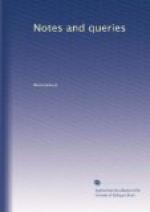I should like to know the year in which a letter of Goring the son’s, printed by Mr. Bell in vol. i. p. 23., was written, if it can be ascertained. As printed, it is dated “Berwick, June 22.” Is Berwick right? Is there a bath there? The letter is addressed to Sir Constantine Huygens, and in it is this passage—
“I have now my lameness so much renewed that I cannot come to clear myself; as soon as the bath has restored me to my strength, I shall employ it in his Highness’s service, if he please to let me return into the same place of his favour that I thought myself happy in before.”
I should expect that this letter was written from France after Goring’s abrupt retreat into that country. It is stated that the letter comes from Mr. Bentley’s collection.
The Earl of Norwich was in Flanders in November 1569, and accompanied the Dukes of York and Gloucester from Brussels to Breda. (Carte’s Letters, ii. 282.)
CH.
If the following account of the Goring family given by Banks (Dormant and Extinct Peerage, vol. iii. p. 575.) is correct, it will appear that the father and both his sons were styled at different times. “Lord Goring,” and that they may very easily be distinguished.
“George Goring, of Hurstpierpont, Sussex, the son of George Goring, and Anne his wife, sister to Edward Lord Denny, afterwards Earl of Norwich, was created Baron Goring in the fourth of Charles I., and in the xx’th of the same reign advanced to the earldom of Norwich, which had become extinct by the death of his maternal uncle above-mentioned, S.P.M.
“He betrayed Portsmouth, of which he was governor, to the king, and rendered him many other signal services. He married Mary, one of the daughters of Edward Nevill, vi’th Baron of Abergavenny, and had issue four daughters, and two sons, the eldest of whom, George, was an eminent commander for Charles I., and best known as ‘General Goring,’ and who, after the loss of the crown to his royal master, retired to the Continent, and served with credit as lieutenant-general to the King of Spain. He married Lettice, daughter of Richard Earl of Cork, and died abroad, S.P., in the lifetime of his father, who survived till 1662, and was succeeded by his only remaining son, Charles Lord Goring, and second Earl of Norwich, with whom, as he left no issue by his wife, daughter of —— Leman, and widow of Sir Richard Beker, all his honours became extinct in 1672. He was unquestionably the Lord Goring noticed by Pepys as returning to England in 1660, and not the old peer his father, who, if described by any title, would have been styled ’Earl of Norwich.’”
BRAYBROOKE.
July 1, 1850.
[Footnote 2: Let me also correct a misprint. Banks, the author of the Dormant and Extinct Perrage, is misprinted Burke.]
* * * * *




